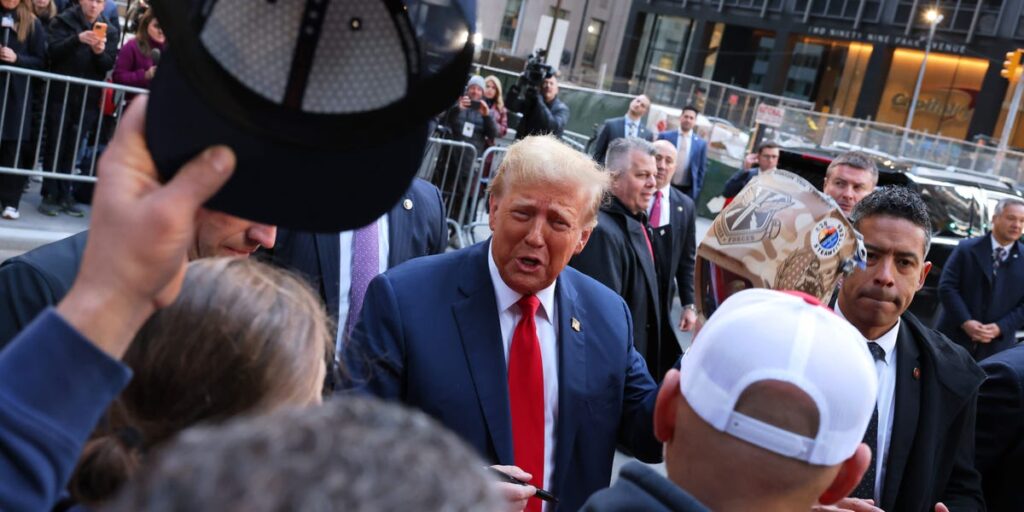Former President Donald Trump’s most recent comments about striking workers could spur political consequences for the Republican nominee in a few key swing states as the fight for the presidency grows ever-tighter.
Two political science experts told Business Insider that Trump’s comments could energize a historically powerful voting bloc at an integral moment in the race.
During a Monday conversation with Elon Musk on X, Trump congratulated the Tesla CEO for being “the greatest cutter.”
“I look at what you do. You walk in and say, ‘You want to quit?’ I won’t mention the name of the company, but they go on strike, and you say, ‘That’s OK. You’re all gone. You’re all gone. So, every one of you is gone.'”
It’s unclear what company Trump was referring to. The Trump campaign did not immediately respond to a request for comment from Business Insider.
The short-term fallout of Trump’s comments was immediate. The United Auto Workers union filed unfair labor practice charges against both Trump and Musk, alleging the men intimidated workers who might want to exercise their right to join a union.
The National Labor Relations Board said it would investigate the charges, which essentially serve as a request for an investigation. Under federal law, firing unionized workers who are participating in a protected strike is illegal.
‘Unforced error’
“It was an unforced error on Trump’s part,” said Christian Grose, professor of political science and public policy at the University of Southern California.
It’s true, experts said, that union members have historically voted for Democrats. President Joe Biden modeled himself as the most pro-union president in decades — a moniker that Vice President Kamala Harris seems eager to adopt.
What is also true is that some union members have been increasingly open to voting Republican in recent years, especially those in blue-collar positions like manufacturing, Grose said. Trump won over blue-collar workers in 2016, in part because of his campaign messaging around the economy, when he railed against trade agreements that he said hurt American workers.
As Harris’ numbers climb, Trump clearly wants at least part of the union vote. He has targeted the International Brotherhood of Teamsters, a 1.4 million-member group that has yet to endorse a candidate.
Sean O’Brien, president of the International Brotherhood of Teamsters, who spoke at the Republican National Convention, told Politico about Trump’s recent comments: “Firing workers for organizing, striking, and exercising their rights as Americans is economic terrorism.”
But the former president’s attitude that he broadcast to more than a million listeners on Monday could jeopardize that sought-after support, political experts said.
“Considering how much this race has tightened up, Trump can’t afford to lose any group of voters, and in particular, not union people,” said Trish Crouse, a practitioner of political science and public administration in residence at the University of New Haven.
Swing state mobilization
While it’s possible that Trump may have lost some small number of previously undecided union voters with his Monday comments, the more likely outcome of his apparent disdain for striking workers is that he angered a sizable group of Democratic voters who just found a new reason to go out and try to win more voters to their side, said Grose.
“There’s a difference between having to go out and mobilize voters because it’s part of your job versus actually being really motivated to mobilize,” Grose said.
Unions have long been a powerful political force with their highly sought-after endorsements and organizational aptitude. But their real power comes in mobilizing, Grose said, adding that their influence on elections has often been outsize to their actual membership numbers.
While membership has been on a precipitous decline in the last few decades, experts said labor groups still wield political power, especially in a couple of key swing states.
Three of the states that Harris and Trump will likely be fighting over come election night have union membership rates of over 12%.
According to 2023 government data, Nevada has 171,000 union members and 201,000 employed people who are union-represented, meaning they claimed no union membership but work jobs that are covered by a union; Michigan has 564,000 union members and 623,000 people have union representation; Pennsylvania has 749,00 union members and 822,000 employees represented by unions, accounting for 12.8% and 14.1% of the state’s employment respectively.
That’s more than 1.6 million union-affiliated people across just three states who are unlikely to appreciate Trump laughing with a billionaire about undermining workers’ rights, experts said.
“That’s gonna light a fire under rank-and-file members to go mobilize,” he added.
The United Auto Workers union quickly pounced on Trump’s recent comments, with President Shawn Fain calling the former president “a scab” and suggesting he stands against “everything our union stands for.”
While it’s possible that Trump’s comments could also have the opposite effect in energizing the business community and anti-union voters, political experts said even business leaders might be wary of coming out in favor of union-busting language.
“I think it was a dumb thing to say so publicly, and especially not a good time to be saying something like that,” Grose said.


